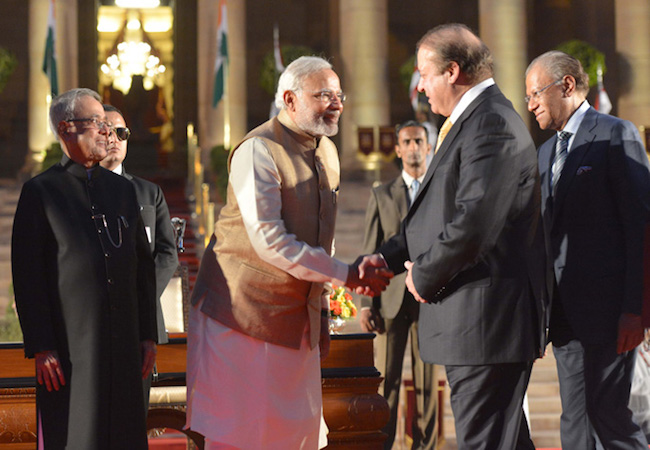
By Nauman Hassan
In contemporary South Asia, the possibility of a shift in realist oriented policies cannot be ratify in absolute terms as anarchic arena of International Affairs. The region conceals to be in transition from realist orientation to cooperation and integration despite the tremendous economic integration initiated by China. Based on Immanuel Kant’s tripod of democracy, economic interdependence and institution, it is debatable that liberal peace has been taken its root in South Asia as the level of mistrust and relative power maximization are predominant.
Historically, the regional powers have been following principles of real-politick in their foreign policy framework towards their regional counterparts. The major regional powers – India and Pakistan – are frequently disrupting peace process through engagement in balance of power and arms race, continuous violation of cease fire agreement, full-fledged and proxy wars and diplomatic stand offs in almost every aspects of international affairs. The sphere of optimism goes shrinking by consideration recent incidents alike accusing Islamabad for backing Uri Attack by New Delhi and detection of Indian Spies at Indian embassy in Pakistan which significantly indicates that the regional structure in predominantly realist oriented. Region’s democratization, economic landscape and institutionalization seems to be failing actors that ensures regional integration and a shift towards liberalist security paradigm.
Since Mr. Nawaz Sharif assumed power in 2013, he showed appetite to improve ties towards economic interdependence and negotiated settlement of all outstanding issues mainly Kashmir. However, Narendra Modi did not respond prospectively towards diplomatic overtures of Islamabad. Grounded at Chanakya’s doctrine, New Delhi’s priority is to keep Pakistan in diplomatic isolation and malign it at international level for intensified hostility. Modi’s irrational stance virtually collapsing composite dialogue and in the consequences, border skirmishes and LOC violations continuously taking place. Owing to changing regional dynamics, India was forced by international community to normalize the relations with Pakistan. Under these circumstances, both sides are talking for the talks but seem futile. It makes difficult to analyze the terms to any possibility of a shift in realist oriented policies of South Asian major actors.
Narendra Modi’s surprise visit to Pakistan in December last year was perceived by Islamabad as a good-will visit and both sides decided to understand each other’s reservations to restart the comprehensive dialogue. The visit of Indian PM followed by participation of Indian Minister for External Affairs, Sushma Swaraj in Heart of Asia conference to signify other approaches towards security relations. Similarly, New Delhi also consider it as a positive step for regional peace and economic prosperity. Aside with that the key development in region over the past few years has been the adoption of economic liberalization, industrialization and market reform policies in various forms and implications for the political economy of this region. Categorically, such initiatives by Indian authorities are taken as rational attitude of Modi Sarkar.
The China Pakistan Economic Corridor (CPEC) is being considered to be a game changer in South Asian region. China is promoting liberal values and liberalist led trade cooperation among South Asian states. These states can mutually led towards a cooperative regional environment through engaging them in economic dependence. In short, the initiatives have the capacity to converge the interest of regional and extra-regional actors. Shanghai Cooperation Organization (SCO) could be very imperative and this can facilitate Pakistan with an opportunity to play its cards smartly. While considering the CPEC, SCO, BCIM and other trade and cooperation projects, there could be a possible shift in South Asian security paradigm. Such initiatives has the potential to promote liberal values and develop a concept of complex interdependence profound by the Robert Keohane and Joseph Nye.
South Asian Association for Regional Cooperation (SAARC), a group of eight countries, took first initiative to economically integrate of member states. Since 1985, the organization formed different agreements between regional states to expand the sphere of economic integration including the tariff rate, establishing SAARC standers organization, phasing out sensitive list and signing an agreement on trade in services. However, the forum is prohibited to address any bilateral contentious issue between member states, the setback to regional cooperation.
The contemporary security environment reveals the other side of the picture as well. The element of mistrust and acrimony still stands high between the two which gives rise to an uncontrolled and alarming sings of arms race in the region. By undermining strategic culture of both states, it can be maintained that the policies of one actor are considered to be as reactionary. NSG quest, New Delhi’s ten years standing defense agreement with US, civil nuclear deal US and Japan, one of the largest arms imports of the world and its heavy presence in Afghanistan resulting more worries for Islamabad. Furthermore, Indian other counterpart, China is modernizing its military and in return India is furthering its nuclear ambitions which forcing region on maintaining realist oriented security landscape. Similarly, on the other hand, the rapidly growing nuclear arsenals of Pakistan, especially its strategic nuclear weapons are worrisome for New Delhi. In addition, Indian accusation of Pakistan as sponsoring terrorism inside its territory add fuel.
More significantly, though all the South Asian states now have democratically elected governments yet the mistrust and chaos is dominating. This is arguably one of the most significant and outweighing factor that indicates a persistent realist oriented security paradigm. Therefore without any exaggeration, it seems obvious that the regional security landscape does not allow the major actors to shift their realist inspired security policies in this persistent environment of uncertainty and ambiguity.




